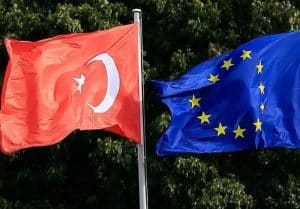PNN – The analysis of the European Union’s annual report on Turkey has attracted the attention of academics in the field of international relations, and they point to 5 main challenges that have dimmed the hope of an agreement between Turkey and the Union.
According to the report of Pakistan News Network, this year the European Union’s special rapporteur on Turkish affairs wrote a report about this country, which contains many criticisms about Turkey’s domestic and foreign policy.
The reading of the said report in the European Union Parliament and the additions added to this text in the security sectors show the high expectations of the Union from the ruling party of Turkey to commit to a series of legal reforms and major changes in the field of foreign policy.
In an analytical note in 5 questions and answers, Eileen Onor Novi, a professor at Gulf University in Istanbul, has examined the various aspects of the European Union’s report on Turkey.
He is a non-resident senior fellow at the Center for Transatlantic Relations at Johns Hopkins University, USA, and is also the author and editor of several theoretical books and his analytical notes have been published in the Huffington Post for several years.
- What are the most important political aspects of the European Union’s report on the political, economic and commercial relations of the Union with Turkey?
The 2023 EU report on Turkey is based on previous approaches and an update of the joint report presented by the Commission and the High Representative in March 2021, which was compiled with the aim of strategic and forward-looking progress and charting the future path.
In addition to the things mentioned in 2021, such as the need to reduce tension in the Eastern Mediterranean, major disputes over the Cyprus issue, criticisms related to the state of human rights and the rule of law in Turkey; New topics can be seen in this report mainly directly related to Turkey’s attitude towards the Russia-Ukraine war, allies’ efforts to expand NATO, as well as Turkey’s approach to regional issues and foreign policy after the Hamas attacks against Israel on October 7, which have been highlighted as an important issue. Therefore, in a general assessment, important differences between Turkey and the European Union in the field of foreign policy have been considered more than other clauses.
The European Union has pointed out that maintaining strategic interests in a stable and safe environment in the Eastern Mediterranean is of great importance and the development of relations is mutually beneficial for the Union and Turkey. The member states of the Union do not shy away from restrictive measures against Turkey when necessary, but the main feature of measures and sanctions is the reversibility element.

- Which challenges are more effective? What are the factors affecting the current state of relations between Türkiye and the European Union?
The main political challenges between the European Union and Ankara are:
Challenges and tensions in the Eastern Mediterranean
Turkey’s approach to the Cyprus issue and insisting on the independence of the Turkish Republic of Northern Cyprus
Türkiye’s specific attitude towards Sweden’s membership in NATO
Türkiye’s failure to comply with EU sanctions against Russia
Erdoğan’s team’s efforts to normalize relations with Syria
Türkiye’s biased statements about Hamas
The special policy of Erdogan’s team to support a certain section of politicians in Libya
The fact is that each of these issues is very important for the Europeans and these obstacles have a negative impact on the relations between Turkey and the European Union. Of course, in this context, the Eastern Mediterranean and Turkey’s two-state solution for the island of Cyprus have been highlighted as a very serious and major problem.
Turkey’s failure to participate in EU defense plans is one of the consequences of this major challenge.
In the text of the report, Turkey’s expectations for joint cooperation with the European Defense Agency and the defense industry of the European Union and the removal of arms embargoes are not included.
The report states that Turkish officials have repeatedly stated that they expect rapid and serious progress in these areas: the resumption of accession negotiations, the modernization of the customs union policy, and visa liberalization.

Regarding the opportunities, it has been pointed out that the need to review Turkey’s role in the security environment of the European Union has gained special importance after the war between Russia and Ukraine. Because Turkey has been able to provide assistance in issues such as energy and food security.
- In what direction will the economic and trade relations between Turkey and the European Union move in the future?
One of Turkey’s important expectations for improving the country’s trade relations with the European Union is to pay attention to a sensitive issue called the full implementation of the rules of the customs union, the elimination of customs duties and additional taxes on trade.
Turkey is a member of the Customs Union without being a member of the European Union, and it has been asking for the updating of the Customs Union for a long time, but this request has not been heeded.
Unlike the Common Customs Tariff, Turkey has unilaterally canceled additional taxes for 500 groups of goods imported from third countries, but the Union has not considered such a privilege for Turkey. As a result, their goods are exported to Turkey without paying customs duties, but Turkey has to pay customs duties when selling its goods to these countries, and this has created a negative business situation for Turkish businessmen.
- What are the proposed solutions to improve relations between Türkiye and the European Union?
According to the documents of the 2021 report, following the European Council’s criticism of Turkey, Turkey’s membership negotiation process was practically abandoned.
As a result, designing a positive agenda is very important as the first step to improving relationships. Returning to the accession negotiations with the valid perspective of membership provided by the European Union, in the shadow of the principles proposed by the Union, i.e. the “progressive, proportional and reversible” approach, did not help the process of relations, and the sanctions and restrictions on Turkey have brought negative results.
Therefore, to return to the accession negotiations, the need to change the approach is not only an important solution, but also a strategic necessity.

- What measures should Turkey and the European Union take to strengthen cooperation in the political, economic and commercial fields?
It can be said that there is a desire to advance the positive trend of relations between Turkey and the European Union after the February 6 earthquake, and for this to be sustainable, high-level dialogues on various issues must be sustainable, and these dialogues should not be subject to special conditions.
The European Union decided to suspend high-level dialogue meetings in some areas in 2019 following Turkey’s drilling activities in the Eastern Mediterranean. The failure to hold political negotiations has also affected the process of cooperation in the economy, energy and transportation sectors.
Given the limitations of the current customs union, only comprehensive modernization, including an effective dispute resolution mechanism and safeguards, will allow the full potential of Turkey-EU economic relations to be used.
As a result, a new outcome between Turkey and the European Union seems unlikely.

